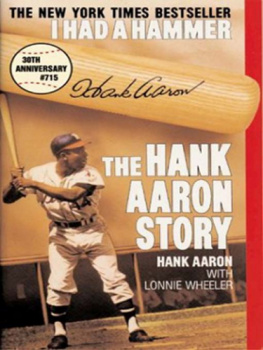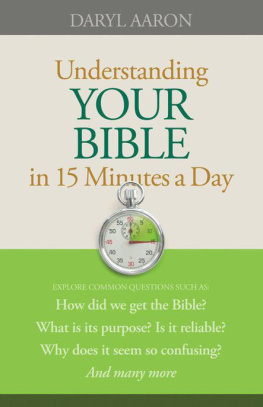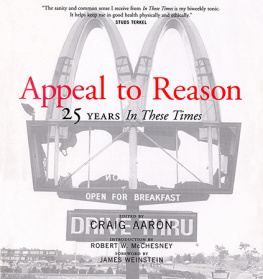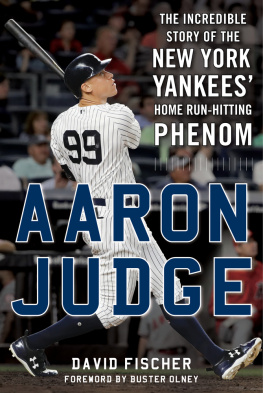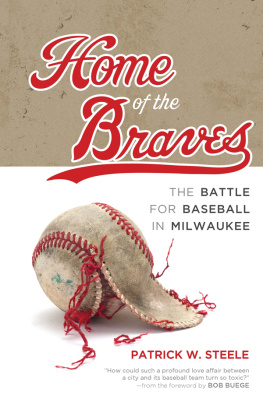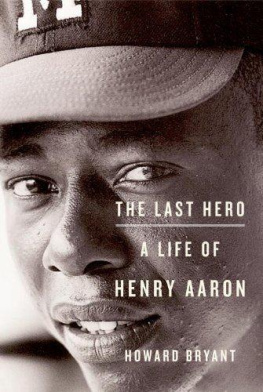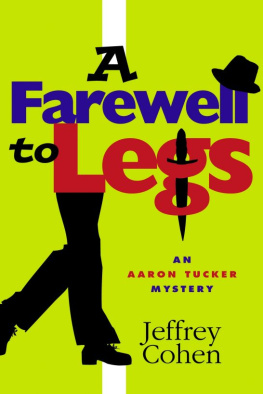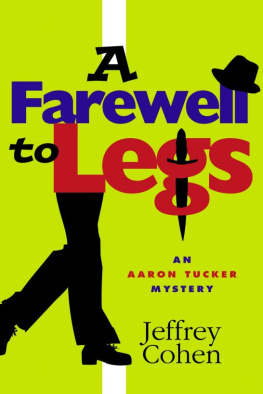For the people who have always stood by me when the going was roughmy wife, Billye; my parents, Herbert and Estella Aaron; and my children, Gaile, Hankie, Lary, Dorinda, and Ceci. I love you all .
H.A.
For all those Negro League and sandlot players who might have been Hank Aarons if they'd only been given the chance .
L.W.
Contents
The day I left Mobile, Alabama, to play ball
Herbert Aaron and his teenage
When Jackie Robinson joined
In 1953, the major leagues
America met Henry Aaron and civil rights
There is a scene from the television
By 1960, the few black players
They called it the city too busy to hate.
At first, it was all about base hits.
There were a few things, if only
The record brought Hank Aaron into
The man played in the major leagues
Hank Aaron is almost twenty years older than I am, which is just about right. I have no baseball memories that predate him, and he is an eminent presence in the earliest ones. Actually, they are glimpses more than palpable memories, single-frame impressions of a figure who was at the same time remote and salient. I recall listening to the radio beyond my bedtime as the Cardinals tried to protect a lead against the Braves in the late innings and thinking what a fearfully difficult thing that was with Aaron, Mathews and Adcock in the middle of Milwaukee's lineup. I recall Aaron's unlined, innocent face on my baseball cards. And I recall sitting on a picnic table at the Art Gaines Baseball Camp in rural Missouri as the coaches talked about hitting a baseball hardnot high and far but hard and raising my hand to tell them that I had been to Busch Stadium in St. Louis and seen Hank Aaron hit a ball that banged off the left-field wall quicker than, well, I don't know what, but quicker than anybody else alive could make a baseball bang against an outfield wall. I knew that would impress them, because they were baseball people and they would know that Hank Aaron was the right name to drop in that situation.
In most company, though, the popular argument back then was Willie Mays or Mickey Mantle, and the popular choice was either of them. Hank Aaron had nothing to do with pop culture; he was just the best guy at swinging a baseball bat, whether or not they appreciated it on the coasts. He was a hitter for the heartland. We knew him as consummately that and nothing more than that, and never would, until he broke Babe Ruth's record for home runs. Even then, Aaron showed us only what he cared to. He seemed a featureless hero, an impenetrable icon whose effortless grace on the playing field was often taken for indolence and whose wary reticence off the field was sometimes mistaken for indifference. When he broke Ruth's record, he was little more than the quiet man who broke Ruth's record.
But how could it be left at that? How could that be all there was to Hank Aaron? There was too much background behind him to leave it at thattoo much baseball, too much history, too much America. How could a man hit 755 home runs and have nothing more to offer? How could a person come out of Alabama as a black teenager in 1952 and not have a perspective for the rest of us to consider? How could he play in the Negro League and not have an experience that speaks to our culture? How could he integrate a Southern minor league and not have stories to pass along? How could a fellow go through all that Hank Aaron had gone through in Milwaukee and Atlanta, in the outfield and the front office, in obscurity and in fame, and not have memories and points of view to submit? It wasn't possible.
Other writers told me that Hank Aaron would have little to say. I didn't believe it, and I didn't care. His life was eloquent enough. He personified so many things that have been so symbolic to the social history of modern America: the Southhe grew up in the deepest part of it, as the damndest color; the Negro Leaguehe started his professional career in it when only a handful of moribund teams remained, and two decades later, when the Negro Leagues were a bygone of Americana, he was the last remnant of their legacy; the fiftieshe gloried in them, playing on pennant winners and coming of age in the fiftiest town in America; the sixtieshe was the most conspicuous athlete in the city that centered the South and headquartered the civil rights movement; the home run recordhe was the object of a polarizing racial controversy that brought out the vicious side of white society and told America more than it wanted to hear about itself.
Hank Aaron was a living metaphor for all of these things, and he was willing to talk about them, as well. More than willing, he was determined to talk about them. To him, it was vital that his experience be brought to light, where it could at least illuminate the past and at best beacon the future. The multifarious forces within him all wanted out. He had a fundamental desire to make a statement with his life, an abiding urge to make a difference, and a consequent need to expose the ignorance, cruelty, and fear that had blackened his fifty-seven years. He had things to say. He had a book in him.
And so we met time and again over the course of nearly two yearsin Atlanta, Milwaukee, Florida, Philadelphia, New York, and Cleveland. I smelled the collard greens simmering on his mother's stove in Mobile and drove the black neighborhoods with his tireless father, turning home on Henry Aaron Loop. In Jacksonville, Florida, I looked into the smart green eyes of his first wife for six straight hours. I spoke with five Hall of Famers, six managers, three owners, ten Aarons, nineteen Mobilians, eighteen Negro Leaguers, and twenty-eight team-mates, among othersmore than a hundred people, in all.
But the book came from Aaronfrom his life, times, and reflections. Aaron's deep Alabama voice accented the details and anecdotes with urgency, worth, and a gentleman's candor. We had the same book in mind, and his recollections were persuasively reinforced by the most reliable of the other sources. This was not a point to be taken for granted, because the popular versions of Aaron's past were not always consistent with the facts. The media, for instance, commonly advanced the notion that Aaron never spoke out about civil rights until his second marriage and pursuit of Ruth. But Aaron maintained that he had stepped forward on racial issues throughout his career, and the old articles bear him out; he was on record in behalf of black managers and desegregated training camps as far back as the late 1950s. Similarly, critics had little sympathy for his wariness of the press, yet the old articles supply abundant cause for this, referring to him repeatedly in plantation-hand terms.
Of course, Aaron's memory, like most people's was not unfailing. There were elusive details that neither he nor the written record could pin down. As an amateur and semipro in Mobile, for instance, he played on numerous, almost interchangeable teams that received little or no coverage in the newspapers. It would have been triumphant to find a journalistic verification of the game in which the Indianapolis Clowns discovered him playing for the Mobile Black Bears as a seventeen-year-old shortstop, but it doesn't exist, and the imprecise oral legend will have to suffice in its stead. It would have been a winning moment, also, to locate a published account of the doubleheader in Buffalo, New York, which moved the Boston Braves to sign Aaron despite the fact that he batted cross-handed. But none was available, and I collected five far-ranging oral versions of this afternoon before a former Braves official sent me a copy of the letter that the Boston scout filed after the games. Aaron's entire Negro League season is obscured by the scarcity of reporting, and some of that which exists only obfuscates the truth more deeply. To wit, it has been passed down through the years that Aaron led the Negro American League in batting, and, in fact, he was atop the published list at the time he joined the Braves' organization in midseason. The list, however, was more than three weeks old at the time of its printing, and Aaron had slipped far out of the lead in the intervening period. Moreover, the flow of misinformation didn't stop when Aaron reached the big leagues. For a player with such sweeping historical connotations, Aaron's legend is surprisingly rife with canards.

